- Home
- Jack Canfield
Chicken Soup for the Cancer Survivor's Soul Page 3
Chicken Soup for the Cancer Survivor's Soul Read online
Page 3
This passion to entertain also led me to a career. Before cancer, I was a dancer on Soul Train. When I was diagnosed, my doctors told me I would never dance again. I fooled them—I still dance, and with a lot of soul. Two years ago, I started taking acting classes. Southern California, where I live, is where most of the entertainment industry is located. I put off going on my first audition because I didn’t want to mess up. Would you believe that when I finally went, I not only got the part, but a lead role on a big show? Northern Exposure! They were two of the best weeks of my life. I played a character, Kim Greer, who is training for a wheelchair race in Cicely, Alaska, and gets a sprained elbow. Maggie (Janine Turner) introduces me to Ed (Darren Burrows) so he can try to heal me with native shaman ways.
Here’s what a day on the set was like. The night before, I studied my lines. I had to get up really early (sometimes at 3 A.M.) to meet the rest of the cast at 4:30 and travel from Seattle to locations. The interior scenes were shot in Redmond, Washington, and the location shots in the little town of Roslyn (population 850). Halfway through makeup I had to go “block” scenes (go through them for the first time with the other actors). Then it was back to finishing my makeup, followed by shooting the scenes. The latter takes a long time because they shoot scenes from different angles, a number of times, and then they have to “process” and “take.” The director was really helpful and funny, and called me “the girl who acts without acting.” After finishing in the early afternoon, I stuck around and watched other scenes being shot. It was very educational.
The cast and crew on that show were so special. I even adopted a “grandpa,” the man who drove the makeup trailer.
Two weeks after I got back, the same director called me to audition for a small part on Beverly Hills 90210. Later I found out they decided to cast me for a big part instead: as a campus activist, opposite Brandon Walsh. I haven’t met any of the 90210 actors yet. Most actors, I find, are very different from the characters they play.
Even though I lost a leg to cancer, I am doing more than I ever have. I learned to snow ski on one leg, and now I race and teach other people to ski. Hey, we don’t cross our ski tips!
While I have goals in acting and writing, I have learned, after having cancer, not to take things too seriously. Life is temporary. So while I still have it, I’m going to have fun with it!
Kristine Kirsten
You Can Teach an Old Dog New Tricks
The mind, in addition to medicine, has powers to turn the immune systems around....
Jonas Salk
As a graduate of one of the top 10 medical schools, and after four years of residency at a New York teaching hospital, I was well trained in the science of medicine. I was kind and compassionate; most of my patients loved me, as I them. Yet I adhered to my training—if it “ain’t” in the medical literature and if it hasn’t undergone rigid double-blind crossover studies, it must be quackery. And so it went for 40 years.
Three months before my 69th birthday, my daughter in California sent me a copy of Quantum Healing by Deepak Chopra, M.D., which explores the field of mind-body medicine.
For my 69th birthday, even though I felt great, I had a complete medical checkup. I received a definite diagnosis of far advanced prostate cancer. The professor at the medical school again confirmed the diagnosis. He told me there’s no cure, but he could slow down the progress of the disease with hormone therapy and I could live 18 to 24 months.
At the time of diagnosis, I went into shock and depression in spite of heroic support from my wife and children. My two daughters in California entered the picture. Immediately, I started reading books and listening to tapes on healing, started a macrobiotic diet, scheduled a course on meditation, had an appointment with a “cancer psychologist” and started visualizing my cancer’s destruction. Not one of these modalities was accepted standard medical therapy, and although I performed them with a huge dose of skepticism, I couldn’t stand up to my family’s forceful persuasion. I was determined to be a good patient and did all of the above regularly and with an attempt at an open mind.
It is now 51 months later. I am well but not the same person. I have made a 180-degree change in my attitude toward the practice of medicine. From a narrow-minded, tunnel-visioned physician, I am now open to all possibilities. I run cancer support groups and espouse diet, meditation, visualization and psychological support. I receive several telephone calls from cancer patients each week who have heard my story and want to know what they can do to help themselves.
Prayer was added about one year ago. Although I had heard about the power of prayer and although my family had me on multiple prayer lines, I was skeptical until I heard Dr. Larry Dossey speak and read his book Healing Words. I now watch for numerous articles on prayer and stories on TV. In my own informal way, I speak to God daily.
My days start with 30 minutes of meditation, prayer and visualization. Shopping and cooking are part of my routine. I eliminated all animal products and fats from my diet and increased the amounts of grains, fresh vegetables and other foods consistent with a macrobiotic diet. I still see a macrobiotic counselor twice a year. Listening to tapes by Dr. Bernie Seigel, Dr. Deepak Chopra, Louise Hay and others intimately involved in the mind-body connection are also part of my daily routine. In my reading, I found many “medical miracles” occurring because of “alternative therapies.”
Many of my colleagues still look at me as a “nut case” who happened to be lucky and go into remission from my cancer. Why? They don’t know. But I do—I had mountains of love and moral support and I chose to change. It saved my life!
Howard J. Fuerst, M.D.
The Boy and the Billionaire
There is no such thing as no chance.
Henry Ford
His sense of humor set Craig Shergold off from the other children. A natural entertainer with an exuberant personality, he loved making people laugh. His greatest joy was putting on wigs and funny hats and staging comedy skits for family and friends at his home in the London suburb of Carshalton.
Craig brought the same buoyant energy to soccer. But in the fall of 1988, his coach noticed a change in the nine–year-old’s normally aggressive play. “He seems to have slowed up,” the coach told Craig’s father, Ernie.
Craig complained of earaches, and his mother, Marion, noticed that his eyes blinked repeatedly when he watched television. He seemed listless, but the family doctor blamed that on Craig’s grief over the recent death of a beloved grandmother. As the weeks passed, however, Craig became more and more subdued.
At Christmas, Craig did not even want to ride his new bicycle. This time the doctor blamed Craig’s problems on an ear infection. Antibiotics did not help.
A couple weeks later, Craig suffered a bout of vomiting. Marion demanded an immediate hospital appointment, and a specialist put Craig through a series of tests. Then he ordered a brain scan.
Afterward, Marion and Ernie were ushered into a doctor’s office. “I’m afraid I have bad news for you,” the doctor said. “Craig has a brain tumor.” Marion was speechless; Ernie bowed his head.
The tumor, the doctor continued, was lodged in a very dangerous spot: near the top of the brain stem, which controls breathing, heart rate and blood pressure.
An ambulance carried Craig to the Great Ormond Street Hospital in central London, and tumor surgery was soon scheduled. Marion didn’t want to tell her son, fearing she’d crush that indomitable spirit. But she had always been truthful with him, and she didn’t want to break that trust. She sat at her son’s bedside and held his hand. “Craig, do you know what you have?”
“I think so, Mum.” He mentioned a character from his favorite TV show who had a brain tumor. “I think I’ve got what she’s got,” Craig said.
Marion nodded. “I want you to be very brave,” she murmured.
“I will be.”
Holding his stuffed elephant for luck, Craig was wheeled toward the operating room on January 17. Marion and Ernie were at
his side. Softly, Marion sang “I Just Called to Say I Love You,” one of Craig’s favorite songs.
Kneeling in the hospital chapel, Marion remembered when she and Ernie first learned that she was pregnant after 10 years of trying. They organized a big celebration at the restaurant where Marion worked as a waitress. Marion led everyone in the singing, dancing and laughing. When Craig was born on June 24, 1979, the joy continued.
Now she pleaded for her son’s life. Lord, Craig’s not ready for you. I won’t let you take him because it’s not his time yet.
Her prayers seemed unanswered. After hours of surgery, the surgeon reported that he could not remove all of the tumor because of its dangerous location. Two weeks later the dreaded news in the pathology report indicated a malignant teratoma, an aggressive cancer of the brain. After his recovery from surgery, Craig received further treatment, but his death seemed all but inevitable.
Marion quit her job so she could stay with her son in the hospital. Ernie, a truck driver, came after work in the evenings. One or the other was by the boy’s bedside 24 hours a day.
Craig received so many get-well cards from family, friends and soccer team members that his doctor joked, “You ought to go for the Guinness Book of World Records.”
Shortly before transferring to The Royal Marsden Hospital, where he would undergo chemotherapy and radiation treatments, Craig received a taped get-well message from his favorite TV personality. Hearing this, a national newspaper published an article on this plucky boy fighting for his life. Soon other newspapers, along with radio and television, picked up the story. Craig became “Our Kid Courage” to the British press.
Craig’s medical condition worsened, however. His legs and left arm were weaker, his speech slow and deliberate, his vision blurred. For all his pain, though, Craig never lost his sense of humor. He even joked about the baldness caused by the chemotherapy. “Knock, knock,” he would say. “Who’s there?” a visitor would respond. “Ad-air,” Craig answered. “Ad-air who?” “Ad-air once, but now I’m bald!” came the punch line.
The fact that so many people cared gave Craig hope. One night in the hospital, his strength sapped by chemotherapy, Craig fought against the sadness he felt. “Mum,” he said, “I’ll think about the cards. Every time I do, it makes me feel better.” In September, in an attempt to build Craig’s morale, the Shergolds told the press he would try to establish a Guinness record for most cards received.
Days later, a small truck pulled up outside the Shergold home, carrying several large sacks of cards. The outpouring led to more publicity—which generated thousands more cards. He received cards from Margaret Thatcher, Prince Charles, George Bush, Ronald Reagan, Mikhail Gorbachev and two of Craig’s idols: Michael Jackson and Sylvester Stallone.
Craig started having real hope of beating the record for most cards collected (1,000,265) held by another English boy. This gave him a sense of purpose, made his condition something more than a cruel twist of fate. In fact, so many cards poured in that Craig received his own “selection box” at the central post office in London, making him the first person in British history designated like a city for mail processing.
On November 17, 1989, the big night arrived. Craig, although shaky, was allowed to go to the local soccer club for the ceremony. As 300 people gathered around, the local post office manager presented Craig with card number 1,000,266—the record breaker. As Craig said thank you, everyone sang “For He’s a Jolly Good Fellow.”
Some 3,800 miles away, in Charlottesville, Virginia, John Kluge received letters from friends. A soft-spoken man of 77, Kluge is a billionaire who made his fortune in the communications business. Kluge’s friends wrote him about Craig and all his get-well cards. They urged Kluge to send a card, too.
As Kluge considered mailing a card, an inexplicable feeling came over him. Amid all the attention focused on the card campaign, he couldn’t help wondering: Had every medical possibility been explored? Was there some treatment he could arrange for the boy?
While Kluge had donated millions to worthy causes, he had never given money to an individual. He didn’t want to start a precedent. And he didn’t want to raise false hopes for Craig’s family. Still, he couldn’t shake the idea that there might be some hope for Craig.
Kluge phoned a close friend, Dr. Neal Kassell, professor of neurosurgery at the University of Virginia Health Sciences Center. “Neal,” he asked, “could you contact the Shergold family? I have the feeling something important might have been overlooked. I’ll pay any expenses.”
Unable to reach the Shergolds by phone, Kassell air-expressed a letter on August 7. Days passed, and the Shergolds did not answer. His letter, of course, had disappeared into millions of others. Since breaking the record, the number of cards skyrocketed to over 26 million.
Craig was in and out of the hospital regularly. On September 20, Craig’s physician, Dr. Diana Tait, asked Marion and Ernie to come to her office. The news was not good. “The latest scans show Craig’s tumor is growing again,” Tait said. The outlook was bleak. The Shergolds were devastated. This time they avoided telling Craig the news.
The next morning, to get her mind off the situation, Marion decided to open some of Craig’s get-well cards. From the stacks of envelopes, Marion plucked the air-express packet containing Kassell’s letter. As she read it, her hands trembled. “I can’t believe this!” she cried.
Marion called Kassell immediately and told him of the discouraging prognosis. Kassell said he could promise nothing, but added that his medical center had recently purchased a “gamma knife,” a new instrument that fired high-energy radiation beams directly into brain tumors. “This might offer a possible treatment for Craig,” he said. “I’ll request the scans from Craig’s doctor.”
When Ernie returned home after work, Marion handed him the letter. “I think God may have given us a miracle,” she said.
When he received the brain scans, Neal Kassell leaned toward the light box for a closer look. In the center of Craig’s brain, he saw a gray, egg-size tumor that compressed his midbrain area and squeezed the brain stem. Kassell’s hopes sank. The tumor was too big to be knocked out by the gamma knife.
Moreover, the mass appeared to branch out and invade surrounding tissue. This seemed to confirm the lab finding that the tumor was malignant. If true, Kassell realized, Craig could never be cured.
Besides, he thought, if he operated, Craig had a one-in–five chance of dying as a result of the surgery. And even if the operation succeeded, he wondered, what would Craig really gain? A few months of life?
Kassell called Kluge with the bad news. “Some things are beyond medical help,” he said.
“Are you absolutely sure you can’t treat it?” Kluge persisted. “Please think about it some more.”
Kassell began searching within himself. The father of three girls, he asked what he would want for them in a similar circumstance. He realized he would give them a fighting chance—despite the risks.
Kassell spoke to the Shergolds in late November. “I might be able to help your son,” he said. The surgical risks were great, the benefits chancy. All he could do, Kassell said, was surgically remove as much of the tumor as possible and hit the remainder with the gamma knife. This might buy Craig some time. Kassell suggested the couple ponder their alternatives over Christmas and let him know their decision after the first of the year.
For Marion, the decision was agonizing. She didn’t want to put Craig through any more pain. Ultimately, she and Ernie decided to let Craig make the decision.
“Mum,” he said, “no pain, no gain.”
Surgery was scheduled for March 1 at the University of Virginia Health Sciences Center. That morning, Marion and Ernie stood at their son’s bedside as Craig reassured them. “I’m going to be all right, you’ll see.”
Moments later, as orderlies wheeled him toward the operating suite, Craig, clutching his stuffed elephant, called out, “I love you, Mum and Dad.” He then began singing, “I Just Cal
led to Say I Love You.”
Kassell removed a two-inch oval of bone from the top of Craig’s skull. Carefully separating his cerebral hemispheres, then splitting the band of fibers joining the two halves, Kassell found the grayish-white tumor almost in the exact center of the brain. It was encapsulated by a membrane—which had not shown up clearly on the scans. Good, Kassell thought, the tumor is much more contained than I had dared hope.
Kassell sliced open the membrane and began snipping and suctioning out the tumor. Moment by moment, his excitement mounted. This tumor did not appear malignant. Could it have somehow changed character since the British lab analysis two years earlier? The more he cut away, the more convinced he became that Craig might beat the odds.
Three hours into the operation, one of his resident physicians grew concerned that Kassell was moving too deep into Craig’s brain. “Don’t go in there,” the resident cautioned.
Kassell paused for a moment. The operation had been a big gamble from the start. Now, as he looked through the operating microscope and saw the final remains of the mass nestled in Craig’s brain, he knew he had to gamble again. He went even deeper.
Kassell left only one small section, mostly scar tissue, in a very risky area. The tissue appeared dead, incapable of ever regrowing.
The surgery took more than five hours. Kassell did not need the gamma knife. Drained and exhilarated, he left the operating room and went to tell Craig’s parents the good news. Marion leaped up and kissed him.
In the intensive-care unit, Marion leaned over Craig’s bedside and whispered, “Craig, the cancer is gone. All gone.”
Craig’s eyes flickered open, and he smiled.
Craig’s recovery was remarkable. His speech became faster and clearer immediately. He pronounced words that had been impossible for him before the operation. Two days after surgery, when Kassell walked into Craig’s room, Craig said, “Doc, you’re supercalifragilisticexpiali–docious”— and broke out laughing.

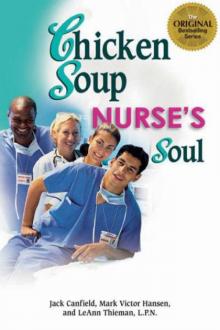 Chicken Soup for the Nurse's Soul: Second Dose
Chicken Soup for the Nurse's Soul: Second Dose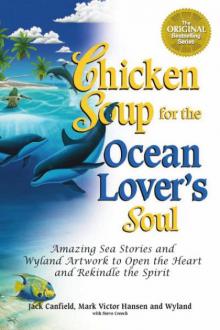 Chicken Soup for the Ocean Lover's Soul
Chicken Soup for the Ocean Lover's Soul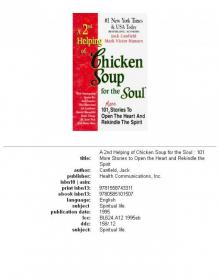 A 2nd Helping of Chicken Soup for the Soul
A 2nd Helping of Chicken Soup for the Soul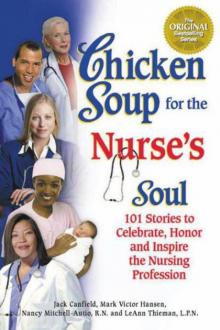 Chicken Soup for the Nurse's Soul
Chicken Soup for the Nurse's Soul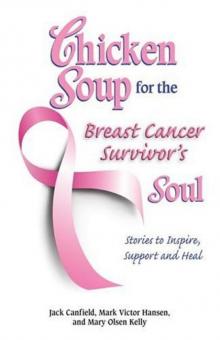 Chicken Soup for the Breast Cancer Survivor's Soul
Chicken Soup for the Breast Cancer Survivor's Soul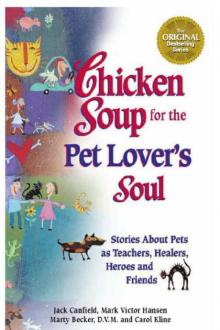 Chicken Soup for the Pet Lover's Soul
Chicken Soup for the Pet Lover's Soul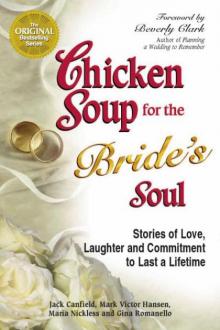 Chicken Soup for the Bride's Soul
Chicken Soup for the Bride's Soul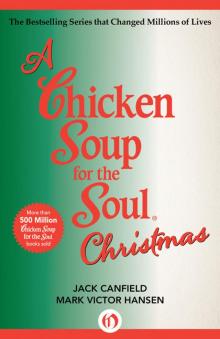 A Chicken Soup for the Soul Christmas
A Chicken Soup for the Soul Christmas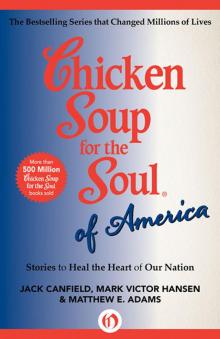 Chicken Soup for the Soul of America
Chicken Soup for the Soul of America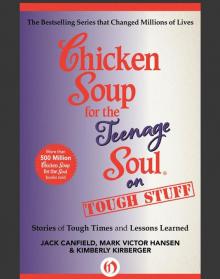 Chicken Soup for the Teenage Soul on Tough Stuff
Chicken Soup for the Teenage Soul on Tough Stuff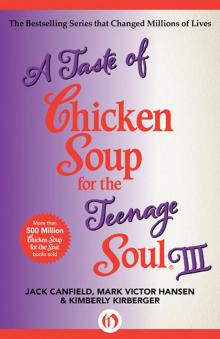 A Taste of Chicken Soup for the Teenage Soul III
A Taste of Chicken Soup for the Teenage Soul III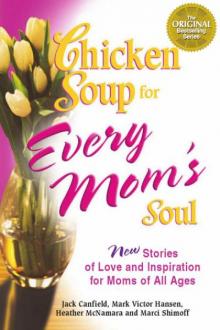 Chicken Soup for Every Mom's Soul
Chicken Soup for Every Mom's Soul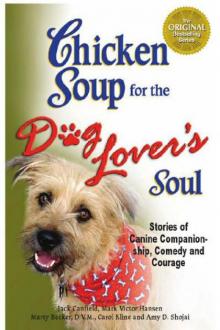 Chicken Soup for the Dog Lover's Soul
Chicken Soup for the Dog Lover's Soul A Second Chicken Soup for the Woman's Soul
A Second Chicken Soup for the Woman's Soul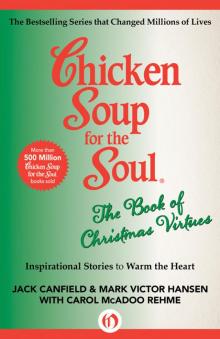 Chicken Soup for the Soul the Book of Christmas Virtues
Chicken Soup for the Soul the Book of Christmas Virtues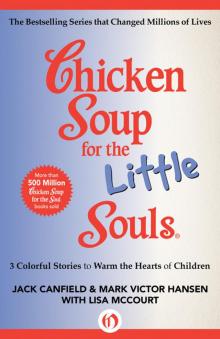 Chicken Soup for the Little Souls: 3 Colorful Stories to Warm the Hearts of Children
Chicken Soup for the Little Souls: 3 Colorful Stories to Warm the Hearts of Children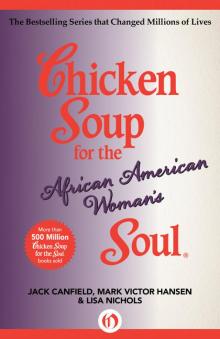 Chicken Soup for the African American Woman's Soul
Chicken Soup for the African American Woman's Soul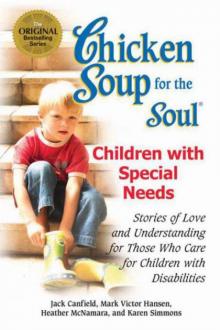 Chicken Soup for the Soul
Chicken Soup for the Soul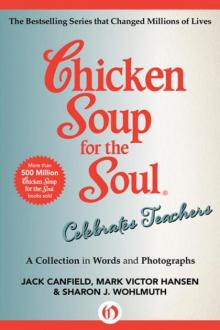 Chicken Soup for the Soul Celebrates Teachers
Chicken Soup for the Soul Celebrates Teachers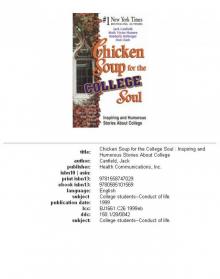 Chicken Soup for the College Soul
Chicken Soup for the College Soul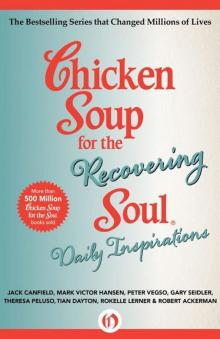 Chicken Soup for the Recovering Soul Daily Inspirations
Chicken Soup for the Recovering Soul Daily Inspirations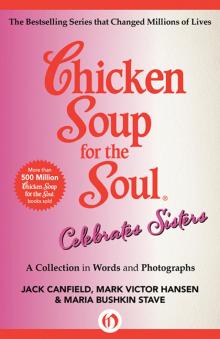 Chicken Soup for the Soul Celebrates Sisters
Chicken Soup for the Soul Celebrates Sisters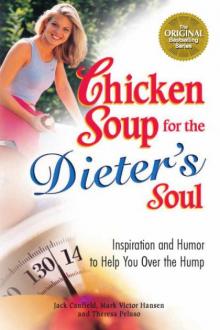 Chicken Soup for the Dieter's Soul
Chicken Soup for the Dieter's Soul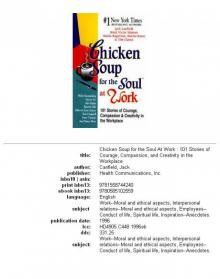 Chicken Soup for the Soul at Work 101 Stories of Courage
Chicken Soup for the Soul at Work 101 Stories of Courage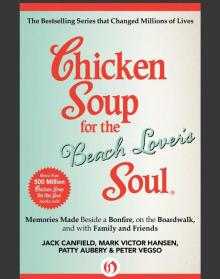 Chicken Soup for the Beach Lover's Soul
Chicken Soup for the Beach Lover's Soul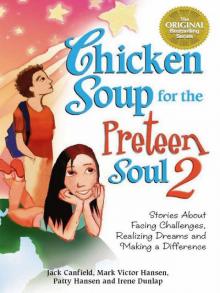 Stories About Facing Challenges, Realizing Dreams and Making a Difference
Stories About Facing Challenges, Realizing Dreams and Making a Difference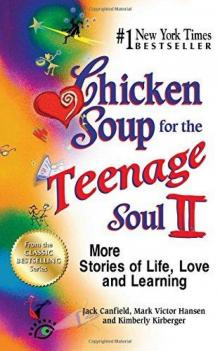 Chicken Soup for the Teenage Soul II
Chicken Soup for the Teenage Soul II Chicken Soup for the Girl's Soul
Chicken Soup for the Girl's Soul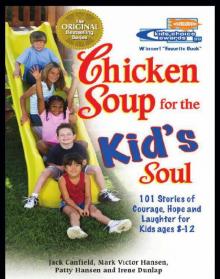 Chicken Soup for the Kid's Soul: 101 Stories of Courage, Hope and Laughter
Chicken Soup for the Kid's Soul: 101 Stories of Courage, Hope and Laughter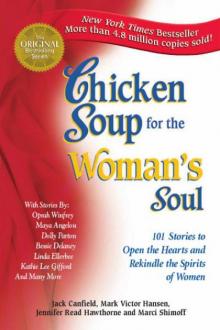 Chicken Soup for the Woman's Soul
Chicken Soup for the Woman's Soul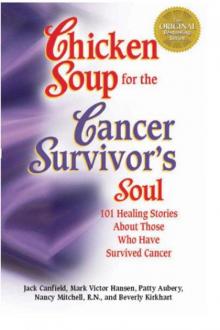 Chicken Soup for the Cancer Survivor's Soul
Chicken Soup for the Cancer Survivor's Soul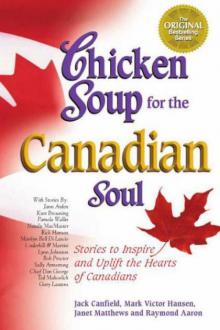 Chicken Soup for the Canadian Soul
Chicken Soup for the Canadian Soul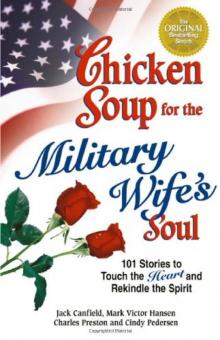 Chicken Soup for the Military Wife's Soul
Chicken Soup for the Military Wife's Soul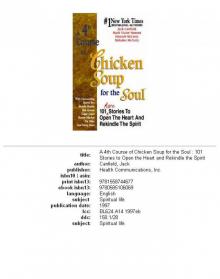 A 4th Course of Chicken Soup for the Soul
A 4th Course of Chicken Soup for the Soul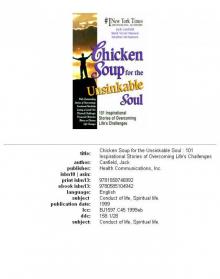 Chicken Soup Unsinkable Soul
Chicken Soup Unsinkable Soul Chicken Soup for the Soul: Christmas Magic
Chicken Soup for the Soul: Christmas Magic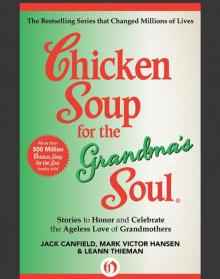 Chicken Soup for the Grandma's Soul
Chicken Soup for the Grandma's Soul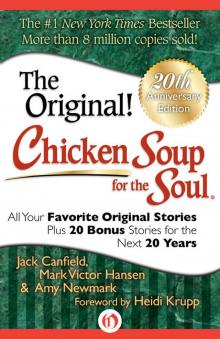 Chicken Soup for the Soul: All Your Favorite Original Stories
Chicken Soup for the Soul: All Your Favorite Original Stories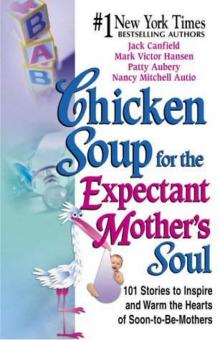 Chicken Soup for the Expectant Mother's Soul
Chicken Soup for the Expectant Mother's Soul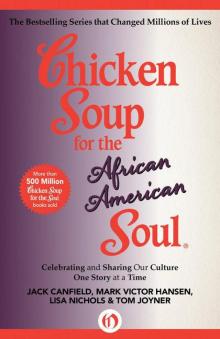 Chicken Soup for the African American Soul
Chicken Soup for the African American Soul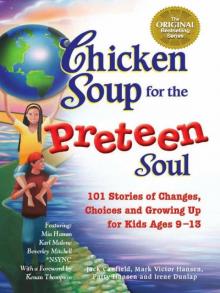 101 Stories of Changes, Choices and Growing Up for Kids Ages 9-13
101 Stories of Changes, Choices and Growing Up for Kids Ages 9-13 Christmas Magic
Christmas Magic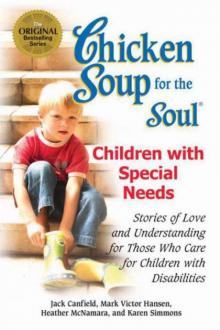 Chicken Soup for the Soul: Children with Special Needs
Chicken Soup for the Soul: Children with Special Needs Chicken Soup for the Soul: Country Music: The Inspirational Stories behind 101 of Your Favorite Country Songs
Chicken Soup for the Soul: Country Music: The Inspirational Stories behind 101 of Your Favorite Country Songs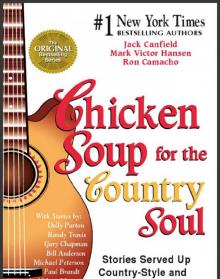 Chicken Soup for the Country Soul
Chicken Soup for the Country Soul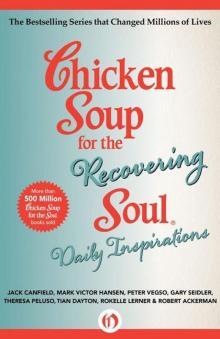 Chicken Soup for the Recovering Soul Daily Inspirations (Chicken Soup for the Soul)
Chicken Soup for the Recovering Soul Daily Inspirations (Chicken Soup for the Soul)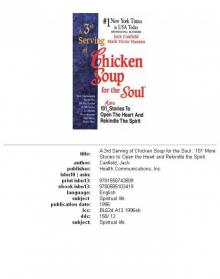 A 3rd Serving of Chicken Soup for the Soul
A 3rd Serving of Chicken Soup for the Soul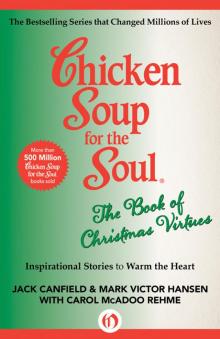 The Book of Christmas Virtues
The Book of Christmas Virtues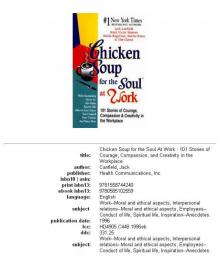 Chicken Soup for the Soul at Work
Chicken Soup for the Soul at Work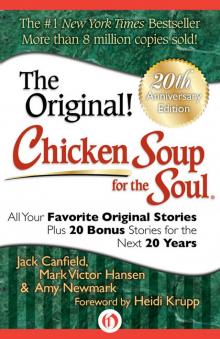 Chicken Soup for the Soul 20th Anniversary Edition
Chicken Soup for the Soul 20th Anniversary Edition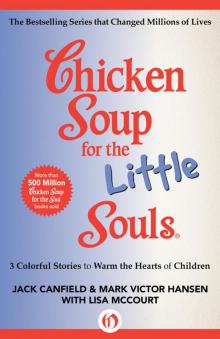 Chicken Soup for the Little Souls
Chicken Soup for the Little Souls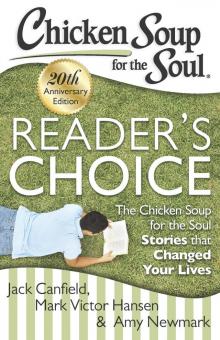 Chicken Soup for the Soul: Reader's Choice 20th Anniversary Edition
Chicken Soup for the Soul: Reader's Choice 20th Anniversary Edition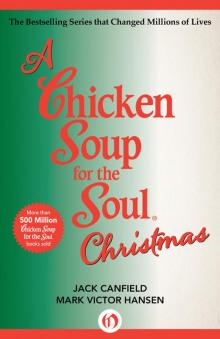 Chicken Soup for the Soul Christmas
Chicken Soup for the Soul Christmas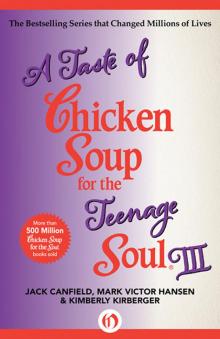 Taste of Chicken Soup for the Teenage Soul III
Taste of Chicken Soup for the Teenage Soul III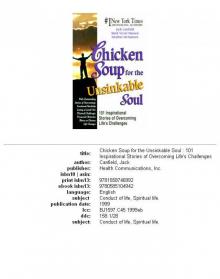 Chicken Soup for the Unsinkable Soul
Chicken Soup for the Unsinkable Soul Chicken Soup for the Preteen Soul II
Chicken Soup for the Preteen Soul II